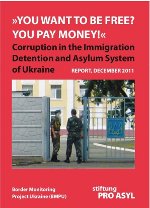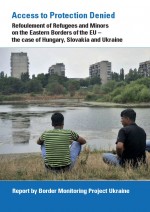The Ukrainian Parliament adopted a new law “On Refugees and Persons in Need of Complementary or Temporary Protection” on 08 June 2011 after the EU had shared Visa Liberalization Action Plan. There are some positive innovations of the new law:
- Adoption of a subsidiary protection
- Only one kind of paper for asylum seekers who are in asylum procedure (instead of 5 or 6 under previous Law)
- Possibilities for a quick family reunification for under age family members
- The refugee passport is valid 5 years instead of 1 year as it was foreseen by the previous Law
However, asylum seekers complain, that they are still confronted with a high level of bureaucracy, while they are trying to receive refugee status. Ukraine created the State Migration Service (SMS) in 2011 to have an independent state body to be in authority for asylum issues. However, in practice SMS is part of the Ministry of Interior and is responsible for developing recommendations for the Ministry of Interior regarding government policy in the areas of migration (emigration and immigration), including combating illegal migration, registration of individuals, refugees and other groups of migrants. It seems, that asylum cases are not the priority for SMS. There is a special department responsible for accepting asylum applications in each regional department of SMS but the decisions of these departments have to be approved by the head of a directorate who is not dealing with asylum cases. The same situation is in the central office of SMS in Kiev: There is a department who observes cases from the regions and makes decisions on granting or not granting refugee status or subsidiary protection, but again – this decision must be approved by the head of SMS.
There is no statistic information on applications, detentions, and appeals for 2013 (nor SMS nor SBGs publishes such statistic) available at the moment. In 2012 SMS received:
- 1860 asylum applications
And there have been:
- 63 positive decisions on granting refugee status
- 89 positive decisions on granting complementary forms of protection.
Detention
A person detained for illegal border crossing (without appropriate passport or visa or crossing the border in a forbidden place) can be detained up to 10 days by the border guards in special temporary detention facilities for foreigners and stateless persons. After this period, the border guards can apply to the administrative court to detain the person up to 12 month for purpose of deportation. Once this decision is made in favor of the border guards the person is send to a Migration Custody Centre (MCC, under the supervision of State Migration Service). In theory, the detainee can appeal this court decision. However, he/she should do this within 5 days. So, practically it is impossible to appeal to the court in this issue, mainly because the appeal has to be send in Ukrainian. In consequence, the majority of the detainees did not have have court decisions on detention and expulsion. At the moment, there are two long-term detention centres (MCCs):
- In Volyn’ region (165 places)
- In Chernigiv region (208 places)
Access to social, medical and legal assistance in detention centers
In Ukraine, only UNHCR or IOM partners have access to detention facilities and provide there any kind of assistance. Often asylum seekers and migrants complain, that they didn’t receive legal or social assistance. These informations can not be verified, because the absence of independent monitoring bodies. Former detainees reported, that they did not have appropriate translation on the court hearing and didn’t understand what was going on and where they have been.
New detention centres
In the last three years, the detention facilities were only half-full. Ignoring this fact, the Ukrainian state continues to build up new detention centres (two big ones in Donetsk and Mykolaiv regions, and a lot of small ones in the border area) with EU money.
Readmission (from EU neighboring countries to Ukraine)
- Hungary: The last years there is a very small amount of readmissions from this country, because the border is highly protected.
- Slovakia: In 2010 and 2011 a lot of unlawful readmissions took place, even minors have been deported. Since 2012 the situation has changed, readmissions heavily decreased.



